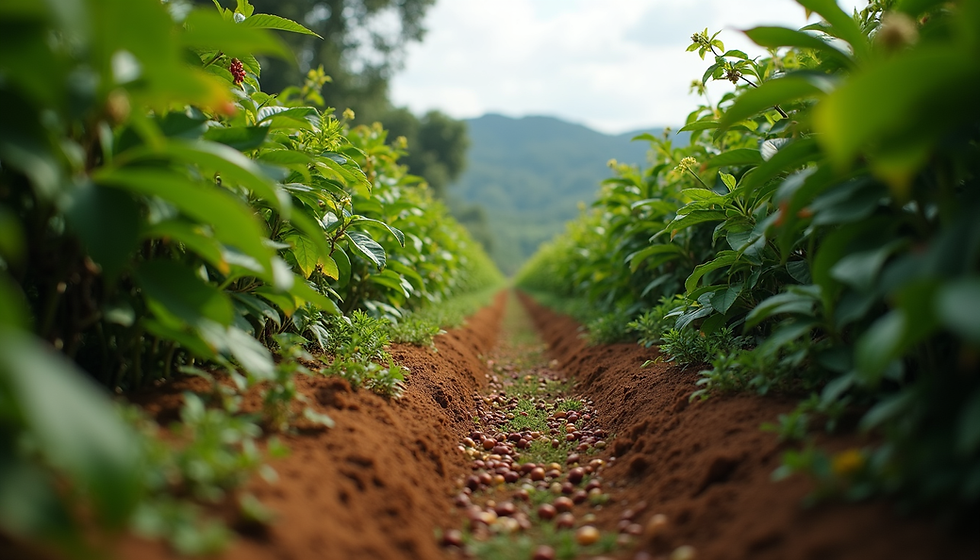How Coffee Farms Are Embracing Sustainability Practices
- Justin Cornelius
- May 6, 2025
- 4 min read
Coffee is more than just a beverage; it's a global industry that connects millions of people every day. As more consumers become aware of the impact of their choices on the environment, coffee farms worldwide are stepping up to embrace sustainable practices. From reducing waste to using organic farming techniques, the focus on sustainability is transforming the coffee landscape.
The Importance of Sustainable Coffee
The increase in coffee consumption has led to the over-exploitation of resources in various regions. Unsustainable practices have not only harmed the environment but have also impacted local communities and farmers' livelihoods. By adopting sustainable coffee practices, farms can help protect ecosystems, promote biodiversity, and improve the quality of life for communities.
One significant factor contributing to sustainable coffee production is the shift towards organic farming. A staggering 3 million hectares in Latin America are devoted to organic coffee cultivation. This conversion helps maintain the soil's health, decreases pesticide usage, and minimizes water pollution. Sustainable coffee farms prioritize ecological health, and as more growers transition, the industry can significantly reduce its carbon footprint.

How Coffee Farms Are Implementing Sustainable Practices
Coffee farms are engaging in a variety of practices to create a more sustainable environment. Here are some of the methods being utilized:
Agroforestry Systems
Agroforestry is the integration of trees and shrubs into coffee farming. This method helps maintain biodiversity, as it creates habitats for wildlife. It can also improve soil quality and allow for better water retention. Farmers using agroforestry can cultivate coffee alongside other crops, which diversifies their income and reduces risks associated with monoculture.
Water Conservation Techniques
Water scarcity is a growing concern for coffee farms in various regions. Farmers are implementing rainwater harvesting systems to collect and store water, ensuring they have enough during drier seasons. Some farms are also investing in drip irrigation systems, which deliver water directly to the root zone, reducing waste.
Organic Fertilizers
Utilizing organic fertilizers instead of synthetic ones is a crucial step in creating a sustainable pathway for coffee production. Organic fertilizers, such as compost, not only nourish the soil but also enhance its structure, ensuring it retains moisture better. Furthermore, they contribute to the carbon cycle, helping reduce greenhouse gas emissions.

Fair Trade Practices
Certification programs like Fair Trade ensure that farmers receive fair wages and can improve the quality of their products. By adhering to these standards, coffee farms can contribute to the socio-economic well-being of the communities they belong to. This integration of social responsibility into farming practices is vital for creating a resilient coffee supply chain.
Innovative Processing Techniques
In addition to planting, coffee farms are changing how they process beans to maintain sustainability. For instance, more farms are investing in eco-friendly coffee processing methods. These methods reduce water usage and minimize waste output, aligning the entire production chain with sustainable values.
What is the Most Sustainable Way to Make Coffee?
When it comes to brewing the perfect cup, sustainability can still play a pivotal role. Here are a few tips for making your daily coffee routine more environmentally friendly:
Choose Sustainable Coffee: Look for brands that are certified organic or Fair Trade. These certifications indicate that the coffee has been produced under sustainable practices.
Use a French Press or Pour Over: These methods do not require electricity and help cut down energy usage. They also eliminate the need for single-use coffee pods.
Grind Your Coffee: Buying whole beans and grinding them just before brewing ensures freshness and gives you more control over your brew. You can also reduce waste by using reusable filters instead of disposable ones.
Compost Coffee Grounds: Instead of tossing out used coffee grounds, consider composting them. They are rich in nitrogen and can enhance your garden's fertility.
By implementing these practices, coffee lovers can enjoy their drink with a clear conscience, knowing they are supporting a sustainable coffee industry.

Challenges and Opportunities in Sustainable Coffee Production
While the movement towards sustainable coffee production is strong, various challenges remain. Climate change poses a significant threat to coffee cultivation, impacting yields and quality. Extreme weather events can lead to crop failures, causing economic strain for farmers who depend solely on coffee for their livelihoods.
Additionally, transitioning to sustainable practices can require significant investment, which many smallholder farmers cannot afford. However, the good news is that several organizations are coming together to support these farmers. Initiatives that provide funding, training, and resources help small farms implement sustainable methods and improve their productivity.
Consumer awareness also plays a crucial role in this transformation. As more buyers seek out sustainable coffee options, the market for eco-friendly products continues to grow. The ripple effect of consumer demand encourages more farms to adapt and provide sustainable choices.
Final Thoughts on Sustainable Coffee Farming
The journey towards sustainable coffee farming is a collective effort. Farmers, consumers, and organizations must work collaboratively to promote practices that prioritize environmental health and social equity. By choosing sustainable coffee and supporting farmers who embrace eco-friendly techniques, consumers can contribute to a greener planet.
For more information on initiatives related to sustainable coffee production, we encourage you to explore resources available through various organizations dedicated to promoting sustainable farming practices.
As we sip our morning coffee, let’s remember that it's more than just a drink; it's a chance to support a sustainable future for coffee and the planet.




Comments